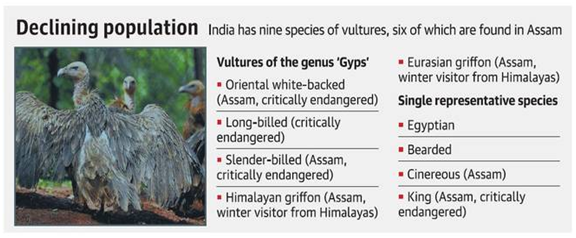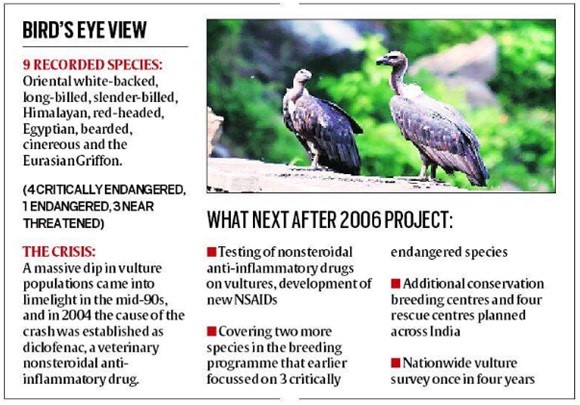Vulture Conservation
Context:
- Conservation plan chalked out after 150 vultures spotted in Bihar’s Valmiki Tiger Reserve.
- Different species of vultures including Egyptian vulture (Neophron percnopterus), Griffon vulture (Gyps fulvus), White-rumped vulture (Gyps bengalensis) and Himalayan griffon (Gyps himalayensis) were among the 150 individuals spotted in VTR.
- The state government has been planning to create a diclofenac-free zone for conservation of vultures in areas bordering Nepal.
Why vultures are important to protect nature?
- Human race has encountered many viruses like COVID-19, our rich biodiversity plays a huge role in keeping the germs at check.
- Of the many organisms, vultures, as carcass feeders, play a significant role. The scavenger birds hold the key for a natural mechanism of infection control.
- Vultures are the scavengers who do the work of cleaning up, and keeping the ecosystem healthy.The beauty is, despite feeding on infected carcass, vultures do not get infected.
- The acids in their stomach are potent enough to kill the pathogen. Thus, the chain of infection is broken. It invisibly controls the spread of harmful pathogens causing deadly anthrax, cholera, foot and mouth disease, rabies and distemper.
- The birds also prevent the contamination of water sources, especially in the wild.
- When animals die near watering hole, there is an imminent danger of contamination resulting in a quick spread of infections and mass death.
- But vultures devour the carcasses in totality thereby preventing a tragic mishap.
In India, we have nine species of vultures
- One can spot the long-billed vulture (Indian vulture), red-headed vulture, white-rumped vulture and the Egyptian vulture in the Nilgiris Biosphere of the Western Ghats.
- In the last four years, the population has grown by may be 10 percent. Restoring the population is an uphill task as vultures are slow breeders.
- If they become extinct, there will be a huge ripple effect. Other scavengers like rats and dogs may take over, temporarily, but with that comes problems like increased incidence of rabies.
- According to scientific studies, a veterinary, non-steroidal, anti-inflammatory drug called diclofenac administered to cattle had led to a catastrophic decline of vulture species in the South Asian region.
- Though diclofenac is now banned, other equally harmful drugs are still in use,” he adds. Bharathidasan, however, is hopeful that vultures will be back in large numbers and circling the blue skies.


https://www.downtoearth.org.in/news/wildlife-biodiversity/conservation-plan-chalked-out-after-150-vultures-spotted-in-bihar-s-valmiki-tiger-reserve-77758



1.png)
